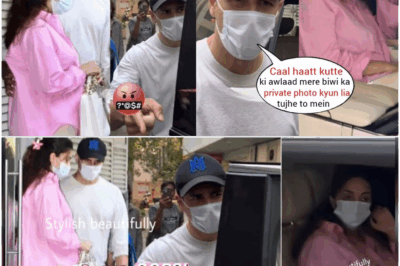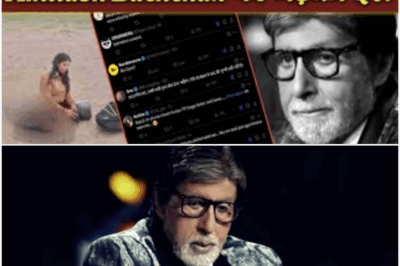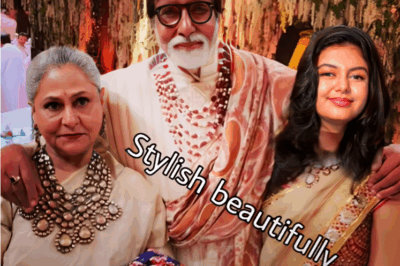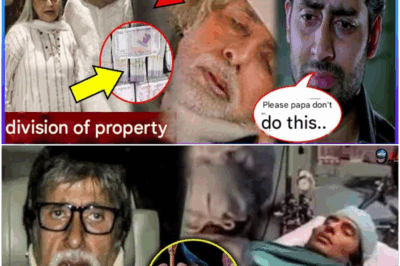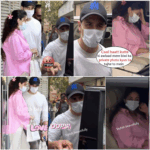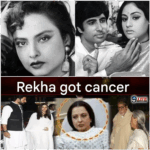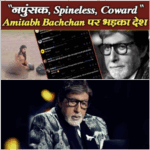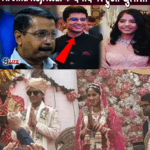Devoleena Bhattacharjee Brokedown for her Brother K*lled on Pahalgam terrore Atteck in Kasmir
.
.
.
play video:
Tragedy in Pahalgam: Devoleena Bhattacharjee’s Heartbreak and a Nation in Mourning After Kashmir Terror Attack
Mumbai, India – The nation is reeling from shock and sorrow after a devastating terror attack in Pahalgam, Kashmir, which claimed the lives of several innocent people, including the brother of popular television actress Devoleena Bhattacharjee. The tragedy has ignited a wave of grief and outrage across the country, with celebrities, public figures, and ordinary citizens expressing their condolences and calling for justice on social media platforms.
The Attack That Shook the Nation
On a quiet day in Pahalgam, a picturesque town known for its beauty and thriving tourism, terror struck without warning. Armed militants targeted a group of civilians, leading to a loss of life that has left families shattered and the nation in mourning. Among the victims was the brother of Devoleena Bhattacharjee, a beloved figure in the Indian television industry best known for her roles in series like “Saath Nibhaana Saathiya.”
The news spread rapidly, with media outlets and social media flooded by messages of shock, anger, and solidarity. Candlelight vigils and marches were organized in several cities as people came together to honor the victims and demand stronger action against terrorism.
Devoleena Bhattacharjee’s Emotional Outpouring
Devoleena Bhattacharjee, known for her strength and candor, took to her social media accounts to share her grief and anger. In a series of heartfelt posts, she condemned the attack and questioned the circumstances that allow such acts of violence to occur.
“Candle marches and all that are fine,” she wrote, “but as far as I understand, without the help of locals, such attacks aren’t possible. Tourism was thriving, but people couldn’t tolerate a peaceful life. Hate is hate. But why are all these always Islamic? Does anyone have an answer? I genuinely want to know what they are taught, what kind of upbringing do they have, what do they study that makes them like this?”
Her words, raw and unfiltered, resonated with thousands who shared her sense of loss and frustration. She continued, “They literally believe in that 72 virgins and all that nonsense. The whole world is troubled by them. I feel their sympathizers should be held accountable and punished. I condemn this act and pray for strength to those left behind.”
Devoleena’s posts quickly went viral, sparking intense debate and reflection across social media. Many praised her courage for speaking out so soon after her personal tragedy, while others called for sensitivity and unity in the face of such a divisive event.
Celebrity Reactions: A Wave of Solidarity
Devoleena was not alone in her grief or her anger. Several prominent television and film personalities, including Aim Riyaz, Aliggoni, and others, also took to their platforms to express solidarity with the victims and their families. Their messages ranged from calls for peace and justice to demands for stricter security measures in conflict-prone regions.
Aim Riyaz wrote, “This is not just a loss for one family, but a tragedy for the entire nation. My heart goes out to Devoleena and everyone affected by this senseless violence. We must stand together against hate and terror.”
Aliggoni added, “No words can ease the pain of losing a loved one to such brutality. We need answers and we need action. Kashmir deserves peace, and so do its people.”
The outpouring of support from the entertainment community was matched by similar sentiments from politicians, activists, and ordinary citizens. Hashtags like #PahalgamAttack, #JusticeForVictims, and #StandWithDevoleena trended for hours, reflecting the collective anguish and demand for accountability.
The Political and Social Context
The Pahalgam attack has once again brought the spotlight back to the enduring conflict in Kashmir, a region that has witnessed decades of violence, political instability, and suffering. While the government has made repeated efforts to restore peace and promote tourism, incidents like these underscore the persistent challenges faced by authorities and the local population alike.
Security experts point out that such attacks are often designed to disrupt normalcy, instill fear, and undermine the sense of progress in the region. The targeting of civilians, especially in areas popular with tourists, is intended to send a message of intimidation and to discourage economic revival.
The government, in response to the latest tragedy, has vowed to intensify counter-terror operations and bring the perpetrators to justice. Senior officials visited the site of the attack and met with the families of the victims, assuring them of support and swift action.
The Debate on Local Involvement and Radicalization
Devoleena’s comments about the alleged involvement of locals and the role of radicalization have sparked a broader debate about the roots of terrorism in Kashmir and beyond. While her pain and anger are understandable, experts caution against generalizations that could further alienate communities already caught in the crossfire.
Sociologist Dr. Anjali Mehra explains, “It’s important to remember that the vast majority of Kashmiris are peace-loving and have suffered immensely due to the conflict. While there may be elements who support or enable violence, painting an entire community with the same brush risks deepening divisions and hindering efforts at reconciliation.”
At the same time, many agree that the issue of radicalization—whether religious, political, or ideological—must be addressed through a combination of security measures, education, and community engagement. The need for open dialogue, empathy, and a focus on shared humanity is more urgent than ever.
Candlelight Vigils and Calls for Justice
In the days following the attack, cities across India witnessed candlelight vigils and marches in memory of the victims. People from all walks of life gathered to express their grief, solidarity, and resolve to stand against terror. In Mumbai, Delhi, Kolkata, and other major cities, crowds held placards demanding justice and chanted slogans of unity.
At one such vigil in Mumbai, a tearful participant said, “We are here not just for Devoleena or her brother, but for every family that has lost a loved one to violence. We want peace, and we want the government to do more to protect us.”
Religious leaders from various faiths also joined the calls for peace, urging their communities to reject hatred and violence in all forms. Interfaith prayers were held, and messages of compassion and understanding were shared widely.
The Media’s Role: Balancing Sensitivity and Responsibility
The Pahalgam attack and its aftermath have posed a challenge for the media, which must balance the need to inform the public with the responsibility to avoid inflaming tensions. While some outlets focused on the human stories of loss and resilience, others were criticized for sensationalizing the tragedy or giving a platform to divisive rhetoric.
Media analyst Rajiv Menon notes, “In times of crisis, the media plays a crucial role in shaping public opinion. It’s essential to report facts, provide context, and amplify voices calling for peace, rather than those spreading hate or fear.”
Devoleena’s own posts, while emotional and controversial, have also prompted important conversations about grief, anger, and the search for answers in the wake of tragedy.
The Path Forward: Healing, Justice, and Hope
As the nation mourns the victims of the Pahalgam attack, attention now turns to the future. For families like Devoleena Bhattacharjee’s, the road to healing will be long and difficult. Grief counselors and support groups have reached out to those affected, offering comfort and assistance.
The government has announced compensation for the victims’ families and reiterated its commitment to combating terrorism. However, many believe that true justice will only be achieved when peace is restored and the cycle of violence is broken.
Community leaders and activists are calling for renewed efforts at dialogue, development, and deradicalization. “We must address the root causes of violence,” says activist Sameer Kaul. “That means investing in education, creating opportunities for youth, and building trust between communities and authorities.”
Devoleena’s Message: Grief, Anger, and a Plea for Answers
For Devoleena Bhattacharjee, the pain of losing her brother is still raw. Her public outcry reflects not only personal anguish but also the frustration of countless families who have suffered similar losses. Her words—however controversial—have given voice to a nation’s grief and its longing for answers.
In a follow-up post, she wrote, “I want to see what everyone has to say now. Enough is enough. We need real change, not just words.”
Her message has struck a chord with many, even as it sparks debate about the best way forward. For now, the focus remains on honoring the memory of those lost, supporting the bereaved, and working toward a future free from fear and violence.
Conclusion: Standing Together in the Face of Tragedy
The Pahalgam terror attack has left an indelible mark on the nation’s conscience. As families grieve and communities rally together, the call for justice, peace, and unity grows louder. Devoleena Bhattacharjee’s heartbreak is a stark reminder of the human cost of violence—and the urgent need for solutions that go beyond rhetoric.
As the candles burn and prayers are offered, India stands at a crossroads. The path ahead will require courage, compassion, and a renewed commitment to the values that bind us together. In the words of one mourner at a Mumbai vigil, “We cannot bring back those we have lost, but we can honor their memory by striving for a better, safer, and more united future.”
News
Siddharth Malhotra Gets ANGRY & Slapped A Paparazzi for Taking Private Picture of Kiara Advani
Siddharth Malhotra Gets ANGRY & Slapped A Paparazzi for Taking Private Picture of Kiara Advani . . . play video:…
Rekha is diagnosed with cancer, admitted to hospital, Amitabh-Jaya shocked | Fact Check |
Rekha is diagnosed with cancer, admitted to hospital, Amitabh-Jaya shocked | Fact Check | . . . play video: Rekha…
People called Amitabh impotent, angry Indians said they will not forgive him | Public Anger on Amitabh
People called Amitabh impotent, angry Indians said they will not forgive him | Public Anger on Amitabh . . ….
Aaradhya bachchan with daadu amitabh bachchan Jaya bachchan in saari look enjoying Puja at home
Aaradhya bachchan with daadu amitabh bachchan Jaya bachchan in saari look enjoying Puja at home . . . play video:…
Saif Ali Khan revealed about his d#ath, wife Kareena Kapoor was shocked
Saif Ali Khan revealed about his death, wife Kareena Kapoor was shocked . . . play video: Saif Ali Khan’s…
Amitabh Bacchan revealed about his illness, Bachchan family got shocked
Amitabh Bacchan revealed about his illness, Bachchan family got shocked . . . play video: Amitabh Bachchan Opens Up About…
End of content
No more pages to load

